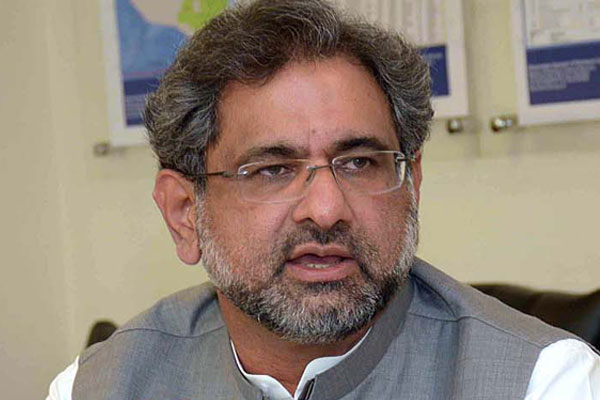New York: Prime Minister Shahid Khaqan Abbasi has scotched speculation of devaluation of the rupee, saying his government is instead looking to curb imports through tariffs and help boost local production.
“Devaluation is our option, theoretically, even though it should incentivize exports but in reality, it doesn’t,” Abbasi said in an interview with Bloomberg News, a New York-based international news agency, at the former house of Quaid-e-Azam Muhammad Ali Jinnah in Karachi. “So, at this moment as I said devaluation is not on the table.”
Pakistan’s current account gap more than doubled to $12.1 billion in the year ended June while its trade deficit surged to a record $33 billion as imports climbed, Bloomberg News said in the dispatch.
The nation’s reserves have plummeted by a quarter to $14.3 billion since reaching a peak in October, while the rupee has remained stable. As a share of the economy, the nation’s 2.9 per cent projected current account gap compares with 1.5 per cent in India and 1.9 per cent in Indonesia, according to International Monetary Fund estimates.
Abbasi said his government, which took over after his predecessor Muhammad Nawaz Sharif was ousted by a court ruling, would focus on cutting “unnecessary” imports.
Despite pressures, the dispatch said Pakistan’s currency had been resilient with help from central bank interventions. “It is the most stable currency in Asia since 2014,” according to data compiled by Bloomberg News.
“It is only a question of when, not if, the rupee will depreciate,” Firat Unlu, an analyst at the Economist Intelligence Unit in London, was quoted as saying. “A weaker currency is needed to correct the imbalances in the external sector and stem the drop in foreign-exchange reserves.” Still, Abbasi said he expected economic growth would meet the government’s 6 per cent target for the year ending June.
That confidence stems from Chinese investment in the nation. China is financing power plants and infrastructure projects valued at more than $50 billion as part of Chinese President Xi Jinping’s “One Belt One Road” initiative. It will help end energy outages before elections that have resulted in long cuts at homes and factories.
A rising middle class is creating demand for goods and services and has attracted overseas investors, including Vitol SA, Puma Energy and Royal FrieslandCampina to tap increasing demand for everything from fuel to milk, the dispatch said. Pakistan’s net borrowing will ease slightly to 4.3 per cent of gross domestic product in 2017 compared with India’s 6.4 per cent and Indonesia’s 2.4 per cent, the IMF estimates.
The removal of former Prime Minister Nawaz Sharif did hurt business sentiment but projects would continue as planned and growth target would be met, according to Prime Minister Abbasi.
The government won’t seek another IMF bailout package and was poised to introduce “radical” tax reform, he said.
Nawaz Sharif had taken a loan from the multilateral lender to stave off a balance-of-payments crisis in 2013, and the facility was completed in September. It showed the system was “insulated” from politics, Abbasi said. “It’s election year. It’s a polarized situation. It’s a very charged atmosphere.”




